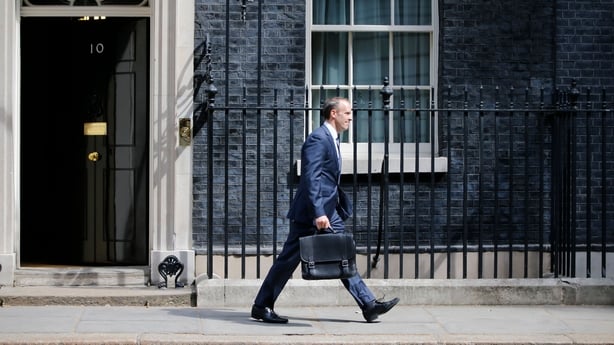There was never going to be a happy outcome to the Dominic Raab bullying investigation.
If the former deputy prime minister had been exonerated then it was expected that senior civil servants would have resigned.
However, Mr Raab's resignation and the manner of his departure has sown the seeds of discord within the Conservative Party and as the party of government, it will also sour its relationship with the civil service.
Right-wing Tories have for some time been blaming the civil service for the fact that Brexit has gone badly.
According to the narrative being pushed by former Brexit Secretary David Davies and others, civil servants negotiated a bad deal.
This has caused a lot of resentment among civil servants who point out that it is up to the Minister to make the final decision on policy.
But it is part of a general complaint by some Tories that the civil service is holding up reform and is to blame for economic problems affecting the country.
This goes to the heart of Mr Raab's defence against the bullying allegations.

Mr Raab, who was in charge of three different departments, claimed that civil servants would revisit his decisions or "relitigate his steers". In a BBC interview, he accused "activist" civil servants of blocking government policy.
Mr Raab has a black belt in karate and was regularly at his desk from 7.30am until 10pm.
He is someone who by his own admission is "inquisitorial, direct, impatient and fastidious" according to the report.
The report could not give many details of the bullying by Mr Raab as it would identify the complainants.
It is known that the report found that he criticised one person as "utterly useless" and "woeful".
But it is also known the findings did not involve putting a hand out to tell someone to stop talking or banging the table as the report did not find these constituted bullying.
And it agreed that Mr Raab was entitled to expect "resilience" from civil servants when they faced criticism.
Nevertheless, the report did find him guilty of intimidating and insulting behavior.
Hitting back, Mr Raab specifically referred in his resignation letter to one incident where he claims government policy was undermined by a civil servant "in the context of the Brexit negotiations over Gibraltar when a senior diplomat breached the mandate agreed by cabinet".
This picture of an inefficient and treacherous civil service will be grist to the mill for the right wing of the Conservative Party who Prime Minister Rishi Sunak has spent so much time trying to keep on board.
But to others in the party, it will seem like going back to the bad old days of Boris Johnson, Liz Truss and Dominic Cummings.
The European Research Group failed to win over a majority of backbenchers to vote against the Winsdor Framework on the Northern Ireland Protocol and it seemed the right wing was losing some of its power.
However, it has been reported that Mr Sunak has given into pressure from his party's right-wingers on the Illegal Migration Bill.
The new law will apparently allow the government to ignore interim injunctions from the European Court of Human Rights to halt deportations, as happened to the first flight of migrants being sent to Rwanda.
The amendments are due to be introduced next week.
It is predicted this will cause strong opposition in the Lords and renewed accusations of breaching international law.
Mr Sunak felt it was necessary to prevent him from relying on Labour support to get the bill through the Commons.
It remains to be seen what effect all this has on the local elections due on 4 May.

